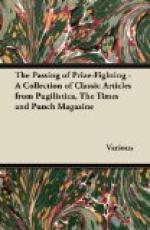* * * * *
[Illustration: THE HYPNOTIST.
BETHMANN-HOLLWEG: “KEEP LOOKING AT ME.
YOU’RE WINNING THE WAR! YOU’RE
WINNING THE WAR! YOU’RE WINNING THE WAR!”]
* * * * *
THE MUD LARKS.
Never have I seen a kiltie platoon wading through the cold porridge of snow and slush of which our front used to be composed, but I have said, with my French friend, “Mon Dieu, les currents d’air!” and thank Fate that I belong to a race which reserves its national costume for fancy-dress balls.
It is very well for MacAlpine of Ben Lomond, who has stalked his haggis and devoured it raw, who beds down on thistles for preference and grows his own fur; but it is very hard on Smith of Peckham, who through no fault of his own finds himself in a Highland regiment, trying to make his shirt-tails do where his trousers did before. But the real heather-mixture, double-distilled Scot is a hardy bird with different ideas from nous autres as to what is cold: also as to what is hot. Witness the trying experience of our Albert Edward.
Our Albert Edward and a Hun rifle grenade arrived at the same place at the same time, intermingled and went down to the Base to be sifted. In the course of time came a wire from our Albert Edward, saying he had got the grenade out of his system and was at that moment at the railhead; were we going to send him a horse or weren’t we?
Emma was detailed for the job, which was a mistake, because Emma was not the mount for a man who had been softening for five months in hospital. She had only two speeds in her repertoire, a walk which slung you up and down her back from her ears to her croup, and a trot which jarred your teeth loose and rattled the buttons off your tunic. However, she went to the railhead and Albert Edward mounted her, threw the clutch into the first speed and hammered out the ten miles to our camp, arriving smothered in snow and so stiff we had to lift him down, so raw it was a mockery to offer him a chair, and therefore he had to take his tea off the mantelpiece.
We advised a visit to Sandy. Sandy was the hot bath merchant. He lurked in a dark barn at the end of the village, and could be found there at anytime of any day, brooding over the black cauldrons in which the baths were brewed, his Tam-o’-shanter drooped over one eye, steam condensing on his blue nose. Theoretically the hot baths were free, but in practice a franc pressed into Sandy’s forepaw was found to have a strong calorific effect on the water.
So down the village on all fours, groaning like a Dutch brig in a cross-sea, went our Albert Edward. He crawled into the dark barn and, having no smaller change, contributed a two-franc bill to the forepaw and told Sandy about his awful stiffness. His eloquence and the double fee broke Sandy’s heart. With great tears in his eyes he assured Albert Edward that the utmost resources of his experience and establishment should be mobilised on his (Albert Edward’s) behalf, and ushered him tenderly into that hidden chamber, constructed of sacking screens, which was reserved for officers. Albert Edward peeled his clothes gingerly from him, and Sandy returned to his cauldrons.




